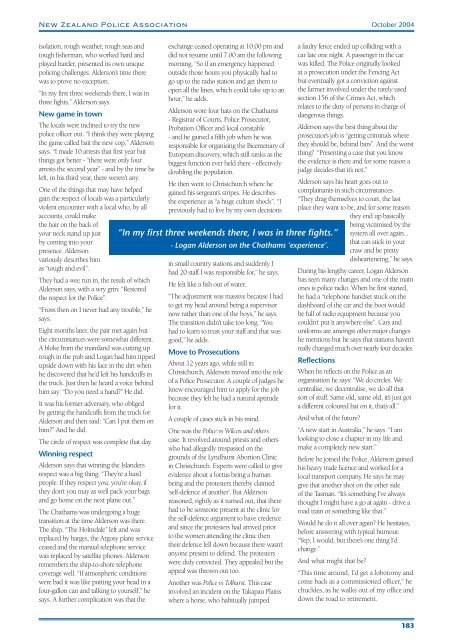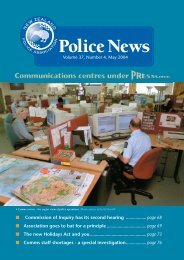Police News Oct.indd - New Zealand Police Association
Police News Oct.indd - New Zealand Police Association
Police News Oct.indd - New Zealand Police Association
You also want an ePaper? Increase the reach of your titles
YUMPU automatically turns print PDFs into web optimized ePapers that Google loves.
<strong>New</strong> <strong>Zealand</strong> <strong>Police</strong> <strong>Association</strong><strong>Oct</strong>ober 2004isolation, rough weather, rough seas andtough fisherman, who worked hard andplayed harder, presented its own uniquepolicing challenges. Alderson’s time therewas to prove no exception.“In my first three weekends there, I was inthree fights,” Alderson says.<strong>New</strong> game in townThe locals were inclined to try the newpolice officer out. “I think they were playingthe game called bait the new cop,” Aldersonsays. “I made 10 arrests that first year butthings got better - “there were only fourarrests the second year” - and by the time heleft, in his third year, there weren’t any.One of the things that may have helpedgain the respect of locals was a particularlyviolent encounter with a local who, by allaccounts, could makethe hair on the back ofyour neck stand up justby coming into yourpresence. Aldersonvariously describes himas “tough and evil”.They had a wee run in, the result of whichAlderson says, with a wry grin: “Restoredthe respect for the <strong>Police</strong>”.“From then on I never had any trouble,” hesays.Eight months later, the pair met again butthe circumstances were somewhat different.A bloke from the mainland was cutting uprough in the pub and Logan had him tippedupside down with his face in the dirt whenhe discovered that he’d left his handcuffs inthe truck. Just then he heard a voice behindhim say: “Do you need a hand?” He did.It was his former adversary, who obligedby getting the handcuffs from the truck forAlderson and then said: “Can I put them onhim?” And he did.The circle of respect was complete that day.Winning respectAlderson says that winning the Islandersrespect was a big thing. “They’re a hardpeople. If they respect you, you’re okay, ifthey don’t you may as well pack your bagsand go home on the next plane out.”The Chathams was undergoing a hugetransition at the time Alderson was there.The ship, “The Holmdale” left and wasreplaced by barges, the Argosy plane serviceceased and the manual telephone servicewas replaced by satellite phones. Aldersonremembers the ship-to-shore telephonecoverage well. “If atmospheric conditionswere bad it was like putting your head in afour-gallon can and talking to yourself,” hesays. A further complication was that theexchange ceased operating at 10.00 pm anddid not resume until 7.00 am the followingmorning. “So if an emergency happenedoutside those hours you physically had togo up to the radio station and get them toopen all the lines, which could take up to anhour,” he adds.Alderson wore four hats on the Chathams- Registrar of Courts, <strong>Police</strong> Prosecutor,Probation Officer and local constable- and he gained a fifth job when he wasresponsible for organising the Bicentenary ofEuropean discovery, which still ranks as thebiggest function ever held there - effectivelydoubling the population.He then went to Christchurch where hegained his sergeant’s stripes. He describesthe experience as “a huge culture shock”. “Ipreviously had to live by my own decisions“In my first three weekends there, I was in three fights.”- Logan Alderson on the Chathams ‘experience’.in small country stations and suddenly Ihad 20 staff I was responsible for,” he says.He felt like a fish out of water.“The adjustment was massive because I hadto get my head around being a supervisornow rather than one of the boys,” he says.The transition didn’t take too long. “Youhad to learn to trust your staff and that wasgood,” he adds.Move to ProsecutionsAbout 12 years ago, while still inChristchurch, Alderson moved into the roleof a <strong>Police</strong> Prosecutor. A couple of judges heknew encouraged him to apply for the jobbecause they felt he had a natural aptitudefor it.A couple of cases stick in his mind.One was the <strong>Police</strong> vs Wilcox and otherscase. It revolved around priests and otherswho had allegedly trespassed on thegrounds of the Lyndhurst Abortion Clinicin Christchurch. Experts were called to giveevidence about a foetus being a humanbeing and the protesters thereby claimed‘self-defence of another’. But Aldersonreasoned, rightly as it turned out, that therehad to be someone present at the clinic forthe self-defence argument to have credenceand since the protesters had arrived priorto the women attending the clinic thentheir defence fell down because there wasn’tanyone present to defend. The protesterswere duly convicted. They appealed but theappeal was thrown out too.Another was <strong>Police</strong> vs Tolhurst. This caseinvolved an incident on the Takapau Plainswhere a horse, who habitually jumpeda faulty fence ended up colliding with acar late one night. A passenger in the carwas killed. The <strong>Police</strong> originally lookedat a prosecution under the Fencing Actbut eventually got a conviction againstthe farmer involved under the rarely usedsection 156 of the Crimes Act, whichrelates to the duty of persons in charge ofdangerous things.Alderson says the best thing about theprosecutor’s job is “getting criminals wherethey should be, behind bars”. And the worstthing? “Presenting a case that you knowthe evidence is there and for some reason ajudge decides that it’s not.”Alderson says his heart goes out tocomplainants in such circumstances.“They drag themselves to court, the lastplace they want to be, and for some reasonthey end up basicallybeing victimised by thesystem all over again...that can stick in yourcraw and be prettydishearteneing,” he says.During his lengthy career, Logan Aldersonhas seen many changes and one of the mainones is police radio. When he first started,he had a “telephone handset stuck on thedashboard of the car and the boot wouldbe full of radio equipment because youcouldn’t put it anywhere else”. Cars anduniforms are amongst other major changeshe mentions but he says that stations haven’treally changed much over nearly four decades.ReflectionsWhen he reflects on the <strong>Police</strong> as anorganisation he says: “We do circles. Wecentralise, we decentralise, we do all thatsort of stuff. Same old, same old, it’s just gota different coloured hat on it, that’s all.”And what of the future?“A new start in Australia,” he says. “I amlooking to close a chapter in my life andmake a completely new start.”Before he joined the <strong>Police</strong>, Alderson gainedhis heavy trade licence and worked for alocal transport company. He says he maygive that another shot on the other sideof the Tasman. “It’s something I’ve alwaysthought I might have a go at again - drive aroad train or something like that.”Would he do it all over again? He hesitates,before answering with typical humour.“Yep, I would, but there’s one thing I’dchange.”And what might that be?“This time around, I’d get a lobotomy andcome back as a commissioned officer,” hechuckles, as he walks out of my office anddown the road to retirement.183

















